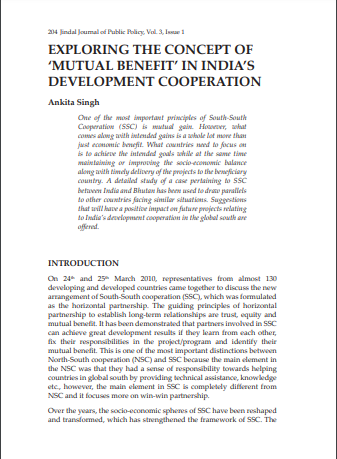Exploring the Concept of ‘Mutual Benefit’ In India’s Development Cooperation
DOI:
https://doi.org/10.54945/jjpp.v3i1.134Abstract
One of the most important principles of South-South Cooperation (SSC) is mutual gain. However, what comes along with intended gains is a whole lot more than just economic benefit. What countries need to focus on is to achieve the intended goals while at the same time maintaining or improving the socio-economic balance along with timely delivery of the projects to the beneficiary country. A detailed study of a case pertaining to SSC between India and Bhutan has been used to draw parallels to other countries facing similar situations. Suggestions that will have a positive impact on future projects relating to India’s development cooperation in the global south are offered.







